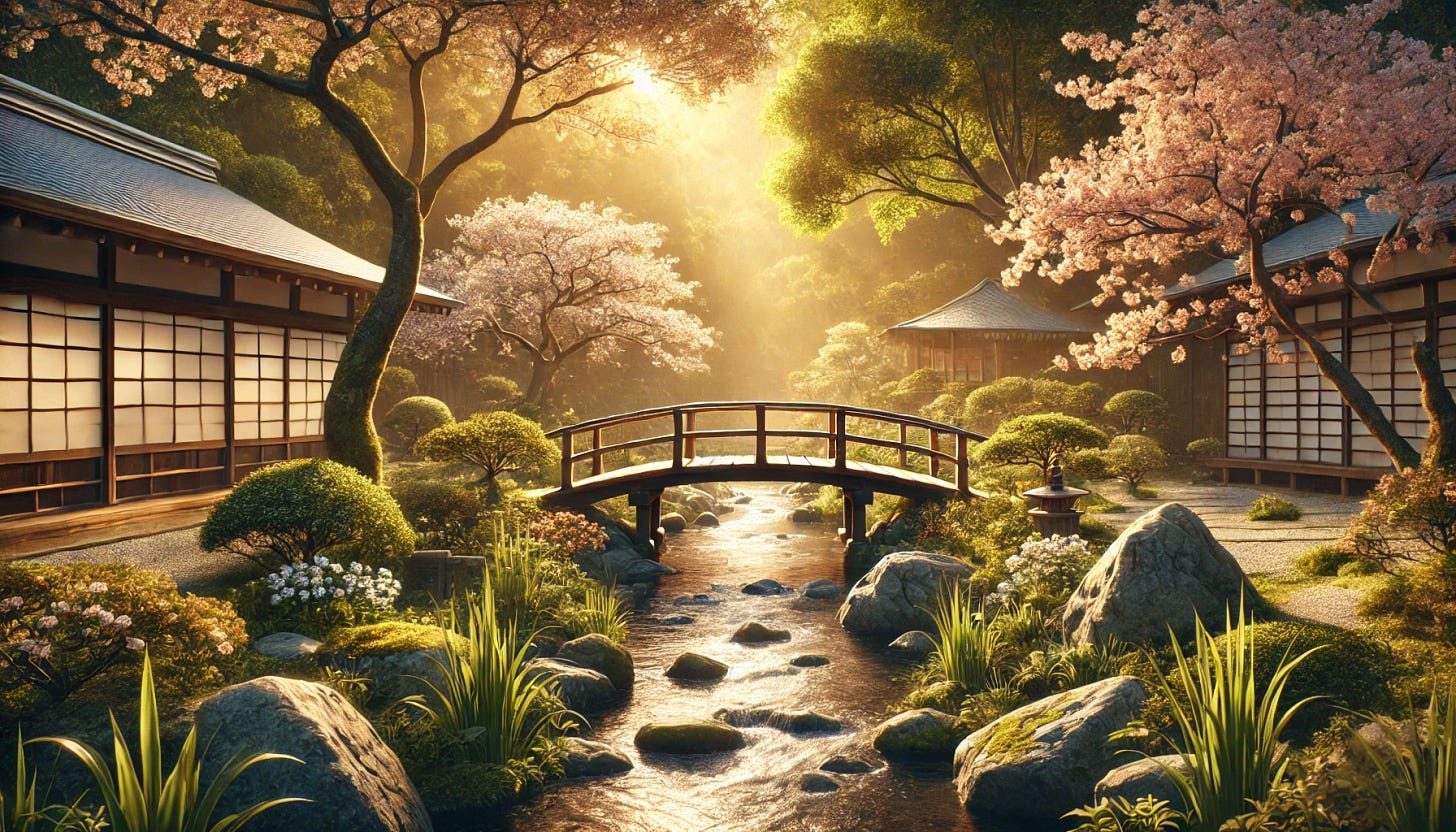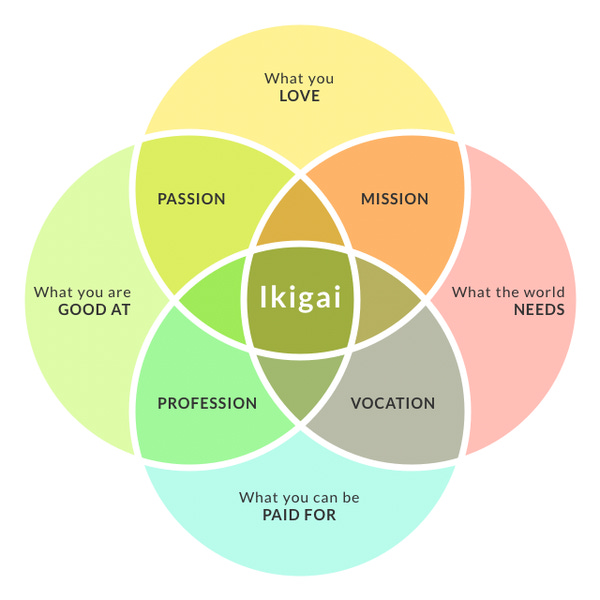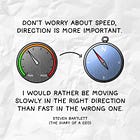Welcome to Polymathic Being, a place to explore counterintuitive insights across multiple domains. These essays explore common topics from different perspectives and disciplines to uncover unique insights and solutions.
Today's topic rethinks our focus on work-life balance and shows how that sequence is completely backward. We’ll also examine how ikigai, a Japanese philosophy of purpose and fulfillment, is misapplied. Then, we will turn it all around and show how success is balancing life before work while uncovering true ikigai.
Intro
I was recently talking to my good friend Rich, who pointed out that the common phrase “work-life balance” is still not balanced at all. It clearly prioritizes work, then life, and finally, the idea of balance. He made a simple observation with a profound impact. We prioritize work first, then life, and finally, balance.
This makes sense in a lot of ways. Without work, we can’t earn money, and without money, what sort of a life do we have? It’s also not as simple as wishing we could just avoid it because work itself is edifying, a fusion of meaning, productive output, and satisfaction. At least, it can be.
This is where the popular idea of ikigai has gained attention over the years. It’s an aspiration where your paid work involves doing something the world needs, which you are not only good at but love doing. In the simple-take, #lifehack, pop-psychology world, it’s been reduced to a mostly bullshit idea in how we apply it to work. Instead of balance, it typically results in chasing the idea of a unicorn job.
The article “Ikigai Trap " explores this quandary. The author shows how the Venn diagram above is a modern and very American application of the Purpose Diagram, which was born from astrology and merely repurposed onto a Japanese concept. Substack author
found the same issue in his essay Ikigai Ruined My Life which I found after writing this essay.The hard truth is that expecting to find ikigai in your career is limited. Worse, as we explored previously in Yes, Do Quite Quit, the probability that your work even cares about your ikigai is even more limited. It’s a fool’s errand predicated on putting work before life or balance. That’s because ikigai is about balance in life first, then how it improves your ability to work.
True Ikigai
The true Japanese concept of ikigai (生き甲斐) has deep cultural roots with a nuanced balance of purpose and fulfillment. Most importantly, ikigai encompasses various aspects of life, from daily routines to broader life goals. It's not confined to grand ambitions but includes simple pleasures and responsibilities, such as caring for family, hobbies, or community engagement. It’s a holistic approach to well-being, emphasizing balance and contentment in everyday life.
This isn’t a uniquely Japanese concept, either. Stoics discovered this balance and the ability to derive satisfaction from any work by focusing on virtue over utility.
writing the , describes it like this:In Nicomachean Ethics, Aristotle separates human action into two buckets:
What we do for money, prestige, power, or another external achievement. This is the utility game.
What we do because it’s good and rewarding in and of itself, with no external reward required to make it worthwhile. This is the virtue game.
To re-emphasize, this balance is across multiple, sometimes dozens of activities and is not generally applicable to a single larger structure like a career. This nuanced twist of Ikigai as a way of life to the modern interpretation of ikigai as an ultimate goal for a career is, ironically, a failure of the very foundations of ikigai. True ikigai is balance in the little things in life that lead to balance and subsequent success writ large.
Balance In Action
I, too, bought the idea of work-life balance and the unicorn chasing of ikigai. I devoted myself to my work and poured my soul into it while desperately trying to balance my life. Annoyingly, it kept backfiring. Work wasn’t fulfilling, and trying to chase that perfect ikigai role was impossible. I was playing the status game.
A couple of years ago, in desperation, I threw in the towel, stepped back, and let go of trying to find a work-life balance. After almost fifteen years of amazing work that was also stressful and often hostile, I took the drastic step of a sabbatical and focused on balancing my life.
I recentered with my family. My kids are 12, 10, and 8, formative years where I can build relationships that will grow and mature into the future. I also leaned in with my wife, and our relationship has never been stronger which builds confidence.
I focused on my health. I built a healthy exercise regimen that included the entire family. I also explored fasting, biomechanics, and trauma. Health is now a cornerstone in our weekly schedules giving me increased focus and energy.
I began writing Polymathic Being as a creative and therapeutic outlet for wrangling complex ideas and sometimes pointing out the terrible leadership I’ve had. This helps improve my ability to analyze and express complex problems.
I started teaching Master’s level Project Management as an Adjunct Professor, which helped mature my skills in teaching, coaching, and mentoring.
I wrote the first two books in The Singularity Chronicles, a sci-fi series about AI that explores what it means to be human. I now have a deeper understanding of psychology and sociology, improving my ability to influence and guide.
I founded a strategic advising firm, Polymathic Disciplines, where I provide analysis and coaching. I’ve worked with some amazing teams who helped me formulate my ideas on Systems Thinking, Keys to Innovation, and more.
I embraced true ikigai without intending to and balanced multiple elements in my life. It was an incredibly rewarding time, both personally and professionally. I was now playing the virtue game.
OK, so what about work? Counterintuitively, all of this focus on balancing life first has resulted in some of my best performance at work. I have more patience and less need for work to satisfy all of my desires. I’ve balanced Ikigai across so many dimensions that work has actually become the ikigai I sought mostly because I stopped seeking it.
Summary
It’s taken me a bit to realize that once I balanced my life, my work performance also became more balanced. I’m working much more efficiently and much more effectively. It’s a classic example of Taoism, which is very much related to Stoicism of intentional and intelligent action. Or, as we might say in the Army Rangers, “Slow is smooth, and smooth is fast.”
True ikigai isn’t chasing a unicorn career to fulfill your needs. It’s also not about life hacks, 10X optimization, or chasing the latest fads online. Instead, focus on the intentional balance of life first. Play the virtue game instead of the utility game and you’ll unlock incredible value at work and fulfillment across all aspects of your life.
Did you enjoy this post? If so, please hit the ❤️ button above or below. This will help more people discover Substacks like this one, which is great. Also, please share here or in your network to help us grow.
Polymathic Being is a reader-supported publication. Becoming a paid member keeps these essays open for everyone. Hurry and grab 20% off an annual subscription. That’s $24 a year or $2 a month. It’s just 50¢ an essay and makes a big difference.
Further Reading from Authors I Appreciate
I highly recommend the following Substacks for their great content and complementary explorations of topics that Polymathic Being shares.
- All-around great daily essays
- Insightful Life Tips and Tricks
- Highly useful insights into using AI for writing
- Integrating AI into education
- Computer Science for Everyone









I loved this perspective, and the traditional explanation of Ikigai. Balance is such a beautiful concept; there has been a lot of push back on work life balance online, yet I think that balance is great to keep in mind when crafting the life of your dreams.
I am so fortunate to have been able to craft the right kind of life for myself, and I also fell into these exact same traps. It's good to see that we have followed similar paths! Life is frustrating for a while, and then something just kind of clicks.
It has taken a few outside moments to reshuffle the cards in my own deck, but every now and then I'm able to question my own assumptions without that sabbatical or dramatic moment (EG, the start of the pandemic or death of a loved one). The sabbaticals are a sure-fire way for me to reconsider things, though, and they work every time - it's just that I am getting way better at deliberately reconsidering what I'm doing on a regular basis.
Now that I'm in that habit, it's like a constantly running subroutine I never much notice. So far, so good.